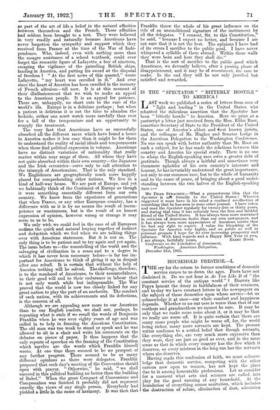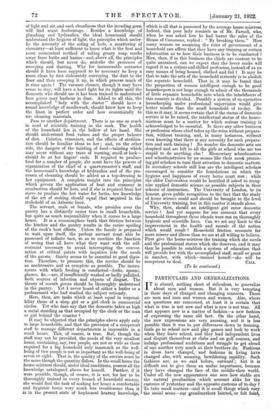HOUSEHOLD PRESTIGE.—I.
THEcrY for the return to former conditions of domestic service comes to us down the ages. Poets have not disdained it. Do we not hear in As You Like It of " the constant service of the antique world " ? Diarists like Pepys lament the decay in faithfulness of their retainers, and to-day we have constant letters in the newspapers on the subject of those domestics upon whose service—let us acknowledge itqt once—our whole comfort and happiness depends. 'nether or no our case is worse than that of our mothers and grandmothers we cannot be sure. It may be only that we make more noise about it, or it may be that we really are worse off. It is quite certain that there are many more people who might be worse off, for, the world being richer, many more servants are kept. The present writer confesses to a settled belief that though servants, like everything else, are very much more expensive than they were, they are just as good as ever, and in the same sense as that in which every country has the Jew which it deserves, so every mistress in the long run has the servants whom she deserves.
Having made this confession of faith, we must acknow- ledge that domestic service, competing with the other careers now open to women, has not kept the place due to it among honourable professions. Let us consider for a moment what arts and sciences are called into play for the good running of any household. At the foundation of everything comes sanitation, which includes the destruction of refuse, elimination of dust, admission of light and air, and such cleanliness that the invading germ will find scant harbourage. Besides a knowledge of plumbing and hydraulics, the ideal housemaid should understand the hygiene of light, the principles which under- lie the necessity of the airing of beds, a smattering of chemistry—at least sufficient to know what is the best and most economical method of taking greasy soap marks away from baths and basins—and, above all, the principles which should, but never do, underlie the processes of sweeping and dusting. Why for innumerable centuries should it have been supposed to be necessary to keep a :oom clean by first elaborately conveying the dust to the floor and then sweeping it up, in which process much of it rises again ? The vacuum cleaner, though it may have come to stay, will have a hard fight for its rights until the domestic who should use it has been trained to understand how germs may harbour in dust. Added to all this, the accomplished lady with the duster " should have a hound knowledge of needlework, should know how to keep the linen in perfect order and how economically to use cleaning materials. Pass to another department. There is no one so much in need of scientific training as the cook. The health of the household lies in the hollow of her hand. She should understand food values and the proper balance of diet. Calories, vitamines, and the effects of steriliza- tion should be familiar ideas to her ; and, on the other side, the dangers of the tainting of food—tainting which may occur without any trace of warning, smell or look— should be at her fingers' ends. If required to produce food for a number of people, she must have the powers of organization of the chief of a quartermaster's staff, and the housemaid's knowledge of hydraulics and of the pro- cesses) of cleansing should be added as a top-dressing to her equipment. A complete insight into the principles which govern the application of heat and economy in combustion should be hers, and if she is required from her stove to produce the hot water for baths, her knowledge of the art of stoking should equal that acquired in the stokehold of an Atlantic liner.
The servant, male or female, who presides over the pantry has a distinctly easier time in small households, but quite as much responsibility when it comes to a large house. It is a commonplace truth that friction between the kitchen and the pantry results in the entire spoiling of the cook's best efforts. Unless the family is prepared to wait upon itself, the parlour servant must also be possessed of infinite tact, so as to combine the function of seeing that all have what they want with the self- restraint necessary to avoid interrupting the conver- sation at critical points with inquiries into the needs of the guests. Gaiety seems to be essential to good diges- tion. Therefore, to promote this, the service should be as unobtrusive and as complete as possible. The instru- ments with which feeding is conducted—forks, spoons, glasses, &c.—are, if insufficiently washed or badly polished, both sources of infection and objects of disgust. The theory of mouth germs should be thoroughly understood in the pantry. Yet I never heard of either a butler or a parlourmaid who had studied the subject seriously. Here, then, are tasks which at least equal in responsi- bility those of a shop girl or a girl clerk in commercial circles. Yet who dare say that the domestic takes as high a social standing as that occupied by the clerk or the man or girl behind the counter ?
It may be objected that the principles above apply only to large households, and that the provision of a competent staff to manage different departments is impossible in a small house. This, of course, is true. But, though the staff may not be provided, the needs of the very smallest home, containing, say, two people, are not so wide as those required for a big household only inasmuch as the well- being of two people is not so important as the well-being of seven or eight. That is, the quality of the service must be the same though the quantity differs. In the small house the house-mistress should, under ideal conditions, possess all the knowledge catalogued above for herself. Further, if it were possible, though, of course, it is not, for her to be thoroughly trained in every branch of household science, she would find the task of making her house a comfortable and hygienic home very much less troublesome than it is in the present state of haphazard hearsay knowledge, which is all that is possessed by the average house-mistress. Indeed, this poor lady reminds us of Mr. Parnell, who, when he was asked how he had learnt the rules of the House of Commons, replied : " By breaking them." How many women on assuming the reins of government of a household can affirm that they have any training or certain information as to how their business is to be conducted ? How, then, if in this business the chiefs are content to be quite untrained, can we expect that the lower ranks will regard it as a serious and skilled profession, instead of as an easy means of being housed, clothed and fed ? It may be that to take the arts of the household seriously is to abolish the separate household. That is, it may be found that the proportion of women intelligent enough to be good housekeepers is not large enough to admit of the thousands of little separate households into which the inhabitants of this country is divided. Possibly a system of co-operative housekeeping under professional supervision would give better results than the small household of to-day. Be this as it may, it seems certain that if the status of domestic service is to be raised, the intellectual status of the house- mistress must be a matter for which serious training is acknowledged to be essential. Is there any other business or profession whose chief takes up the reins without prepara- tion, without training, and, in many instances, without even knowing that there is any necessity for such prepara- tion and such training ? No wonder the domestic arts are despised and are left to all the girls at school who are too stupid to do anything else ! Elementary schoolmasters and schoolmistresses by no means like their meat promis- ing girl scholars to turn their attention to domestic matters. In secondary schools still less are the intelligent scholars encouraged to consider the foundations on which the hygiene and happiness of every home must rest ; while the older Universities would be horrified if asked to recog- nize applied domestic science as possible subjects in their scheme of instruction. The University of London, to its honour, gives public recognition to the fact that the study of home science could and should be brought to the level of University training, but in this matter it stands alone.
Why, then, should an intelligent girl enter domestic service ? And yet suppose for one moment that every household throughout these islands were run on thoroughly hygienic and scientific lines. Can we set any limit to the improvement in the health and morale of the nation which would result ? Household friction accounts for more misery and illness than we are at all willing to believe. First give the house-mistress the training which she needs and the professional status which she deserves, and it may then be possible to establish a system of education that will provide her with the accomplished staff, small or great in number, with which—trained herself—she will be competent to deal. Cana.
(To be continued.)



































 Previous page
Previous page